貧困問題についてのノート:Note on Poverty [Report]
貧困問題についてのノート:Note on Poverty
NOTE: POVERTY
I. Absolute (Extreme) Poverty
“For a few years starting 1990, The World Bank anchored absolute poverty line as $1 per day. Now, the World Bank defines ‘extreme poverty’ as living on less than US$1.25 (PPP) per day”: Wikipedia: http://en.wikipedia.org/wiki/Poverty
Change in % of the absolute poor (with less than $1.25)
From 1981 to 2008
East Asia/Pacific 77.2% (1981) ---> 14.3% (2008)
South Asia 61.6% (1981) ---> 36.0% (2008)
Sub-Saharan Africa 51.5% (1981) ---> 47.5% (2008)
World 52.2% (1981) ---> 22.4% (2008)
“1.29 billion people were living in absolute poverty in 2008. Of these, about 400 million people in absolute poverty lived in India and 173 million people in China”
From 1990 to 2010
“The world has lately been making extraordinary progress in lifting people out of extreme poverty. Between 1990 and 2010, their number fell by half as a share of the total population in developing countries, from 43% to 21%………………....
China is responsible for 3/4 of the achievement. It has been growing so fast that, even though inequality is rising fast, extreme poverty is disappearing.”
http://www.economist.com/news/leaders/21578665-nearly-1-billion-people-have-been-taken-out-extreme-poverty-20-years-world-should-aim
UN Millenium Development Goal Report 2012:
Extreme poverty is falling in every region; the poverty reduction target was met.
http://www.un.org/millenniumgoals/pdf/MDG%20Report%202012.pdf#page=7
II. Relative poverty
“Usually, relative poverty is measured as the percentage of population with income less than some fixed proportion of median income……..The main poverty line used in the OECD and the EU is based on "economic distance", a level of income set at 60% of the median household income.”
http://en.wikipedia.org/wiki/Poverty#Relative_poverty
OECD: Percentage of the poor with less than 50% of median income (late-2000s)
OECD Member Average: 11.1% (+1.0 % point since mid-1980s)
US 17.3% (-0.1), Japan 15.7% (+1.3), Korea 15.0% (N/A), Australia 14.6% (+1.9)
http://www.oecd-ilibrary.org/social-issues-migration-health/society-at-a-glance-2011_soc_glance-2011-en
III. Poverty Reduction Policy in Asia
1) MDG (Millennium Development Goals)
Goal 1: Eradicate Extreme Poverty and Hunger by 2050
“We can reduce poverty and hunger by (1) investing in agriculture, (2) creating jobs, (3) expanding social safety nets, (4) expanding nutrition programs that target children under 2 years of age, (5) universalizing education, (6) promoting gender equality, and (7) protecting vulnerable countries during crises.
http://www.worldbank.org/mdgs/poverty_hunger.html
2) ADB: “Poverty Reduction in Asia and the Pacific: 12 Things to Know”
“While 150 million moved out of extreme poverty from 2005 to 2008, the number of moderately poor - those living between $1.25 and $2 per day - dropped only marginally, by around 18.4 million.”
“MDG targets for primary education completion, child mortality, access to clean water in urban areas, and access to improved sanitation in rural and urban areas are proving difficult to achieve.”
www.adb.org/features/12-things-know-2012-poverty-reduction-asia-and-pacific
3) ADB: “Rural Poverty”
“About half of Asia's poor people live in rural areas. These also include the poorest of the poor, often indigenous people or vulnerable groups with little economic opportunities. The majority of rural environmental poor live in marginal dryland and wetland areas and their numbers are likely to increase with global warming. For these people, ADB support includes: (1) rural infrastructure and connectivity, (2) natural resources conservation, (3) land reforms, water rights & empowerment of women, (4) off-farm employment opportunities, (5) security from natural disasters & new forms of social protection, (6) managed migration to urban areas.”
“Microfinance is an effective development tool for promoting pro-poor growth.”
http://www.adb.org/themes/poverty/overview
4) Microfinance (Microcredit) for Poverty Reduction
About Microfinance: https://www.youtube.com/watch?v=bpSNM625LFU
What is microfinance?: https://www.youtube.com/watch?v=JR9UQeZrT_g
“The Grameen Bank originated in 1976, in the work of Prof. Muhammad Yunus (later awarded the Nobel Peace Prize), who was inspired during the Bangladesh famine of 1974 to make a small loan of US$27 to a group of 42 families as start-up money so that they could make items for sale. Micro-credit loans are based on the concept that the poor have skills that are under-utilized and, with incentive, they can earn more money.” Wikipedia: http://en.wikipedia.org/wiki/Grameen_Bank/
NOTE: POVERTY
I. Absolute (Extreme) Poverty
“For a few years starting 1990, The World Bank anchored absolute poverty line as $1 per day. Now, the World Bank defines ‘extreme poverty’ as living on less than US$1.25 (PPP) per day”: Wikipedia: http://en.wikipedia.org/wiki/Poverty
Change in % of the absolute poor (with less than $1.25)
From 1981 to 2008
East Asia/Pacific 77.2% (1981) ---> 14.3% (2008)
South Asia 61.6% (1981) ---> 36.0% (2008)
Sub-Saharan Africa 51.5% (1981) ---> 47.5% (2008)
World 52.2% (1981) ---> 22.4% (2008)
“1.29 billion people were living in absolute poverty in 2008. Of these, about 400 million people in absolute poverty lived in India and 173 million people in China”
From 1990 to 2010
“The world has lately been making extraordinary progress in lifting people out of extreme poverty. Between 1990 and 2010, their number fell by half as a share of the total population in developing countries, from 43% to 21%………………....
China is responsible for 3/4 of the achievement. It has been growing so fast that, even though inequality is rising fast, extreme poverty is disappearing.”
http://www.economist.com/news/leaders/21578665-nearly-1-billion-people-have-been-taken-out-extreme-poverty-20-years-world-should-aim
UN Millenium Development Goal Report 2012:
Extreme poverty is falling in every region; the poverty reduction target was met.
http://www.un.org/millenniumgoals/pdf/MDG%20Report%202012.pdf#page=7
II. Relative poverty
“Usually, relative poverty is measured as the percentage of population with income less than some fixed proportion of median income……..The main poverty line used in the OECD and the EU is based on "economic distance", a level of income set at 60% of the median household income.”
http://en.wikipedia.org/wiki/Poverty#Relative_poverty
OECD: Percentage of the poor with less than 50% of median income (late-2000s)
OECD Member Average: 11.1% (+1.0 % point since mid-1980s)
US 17.3% (-0.1), Japan 15.7% (+1.3), Korea 15.0% (N/A), Australia 14.6% (+1.9)
http://www.oecd-ilibrary.org/social-issues-migration-health/society-at-a-glance-2011_soc_glance-2011-en
III. Poverty Reduction Policy in Asia
1) MDG (Millennium Development Goals)
Goal 1: Eradicate Extreme Poverty and Hunger by 2050
“We can reduce poverty and hunger by (1) investing in agriculture, (2) creating jobs, (3) expanding social safety nets, (4) expanding nutrition programs that target children under 2 years of age, (5) universalizing education, (6) promoting gender equality, and (7) protecting vulnerable countries during crises.
http://www.worldbank.org/mdgs/poverty_hunger.html
2) ADB: “Poverty Reduction in Asia and the Pacific: 12 Things to Know”
“While 150 million moved out of extreme poverty from 2005 to 2008, the number of moderately poor - those living between $1.25 and $2 per day - dropped only marginally, by around 18.4 million.”
“MDG targets for primary education completion, child mortality, access to clean water in urban areas, and access to improved sanitation in rural and urban areas are proving difficult to achieve.”
www.adb.org/features/12-things-know-2012-poverty-reduction-asia-and-pacific
3) ADB: “Rural Poverty”
“About half of Asia's poor people live in rural areas. These also include the poorest of the poor, often indigenous people or vulnerable groups with little economic opportunities. The majority of rural environmental poor live in marginal dryland and wetland areas and their numbers are likely to increase with global warming. For these people, ADB support includes: (1) rural infrastructure and connectivity, (2) natural resources conservation, (3) land reforms, water rights & empowerment of women, (4) off-farm employment opportunities, (5) security from natural disasters & new forms of social protection, (6) managed migration to urban areas.”
“Microfinance is an effective development tool for promoting pro-poor growth.”
http://www.adb.org/themes/poverty/overview
4) Microfinance (Microcredit) for Poverty Reduction
About Microfinance: https://www.youtube.com/watch?v=bpSNM625LFU
What is microfinance?: https://www.youtube.com/watch?v=JR9UQeZrT_g
“The Grameen Bank originated in 1976, in the work of Prof. Muhammad Yunus (later awarded the Nobel Peace Prize), who was inspired during the Bangladesh famine of 1974 to make a small loan of US$27 to a group of 42 families as start-up money so that they could make items for sale. Micro-credit loans are based on the concept that the poor have skills that are under-utilized and, with incentive, they can earn more money.” Wikipedia: http://en.wikipedia.org/wiki/Grameen_Bank/
JIMA-USC Conference on Global Finance: JIMA-USC国際金融コンファレンス [Report]
JIMA-USC Conference on Global Finance: JIMA-USC国際金融コンファレンス
Theme: "Financial Adjustment in the Aftermath of the Global Crisis: New World Order?"
テーマ:「国際金融危機以後の金融調整:新世界秩序か?」
Date: April 18-19, 2014
日程:2014年4月18日~19日
Place: USC Davidson Conference Center, Los Angeles
場所:ロサンゼルス・USCデビッドソン・コンファレンス・センター
Agenda & Papers: 内容へのリンク
http://dornsife.usc.edu/conferences/jimf-usc-conference-2014/agenda/
Report: レポート
April 19(Sat) Session #3
4月19日(土) セッション3
Chair: Jeff Nugent, USC:
チェア:ジェフ・ニュージェント(南カリフォルニア大学)
9:00-9:50am
"Japanese Monetary Policy and the Yen: Is There a 'Currency War'?"
「日本の金融政策と円:通貨戦争か?」
Pesenters: Koichi Hamada, Yale Unversity, and Robert Dekle, USC
発表者:浜田宏一(エール大学)、ロバート:ディークル(南カリフォルニア大学)
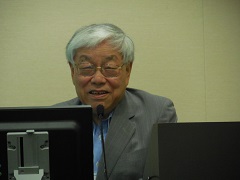
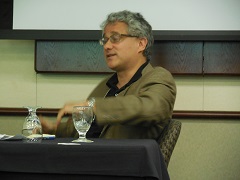
Discussant: Takeo Hoshi, Stanford Univ.: 討論者:星 岳雄(スタンフォード大学)
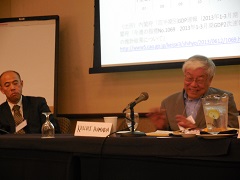
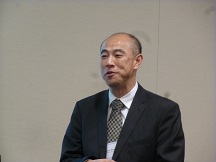
Q&A: Discussion from the floor: 質疑応答:参加者からの質問
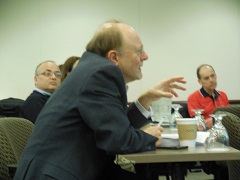
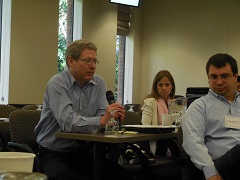
Note: In response to Takahiro Miyao's question to Prof. Hamada about his possible advice to PM Abe and the BOJ in order to overcome the current doldrums in the Japanese economy, Prof. Hamada suggested that he might probably recommend a further stimulus policy (additional quantitative easing) to the government and the BOJ, but will wait until after he examines various data to assess the effects on the economy of the consumption tax rate increase, which took place on April 1.
記:現在の日本経済の低迷を乗り越えるために安倍政権と日銀にどのようなアドバイスをするかという宮尾尊弘の質問に対して、浜田教授は、おそらくもう一段の景気刺激策(追加的な量的緩和策)を勧めると思うが、当面は4月1日に実施された消費税率引き上げの経済への影響をデータでよく見極めてからにするという答えであった。
9:50-10:40am
"Official Financial Flows, Capital Controls, and Global Imbalances"
「公的な資金フロー、資本移動規制、およびグローバルな不均衡」
Presenter: Joe Gagnon, Institute for International Economics
Discussant: Zhang Liu (Federal Reserve Bank of San Francisco)
発表者:ジョー・ギャ二オン(IIE)、討論者:ジャン・リュー(FR Bank of SF)
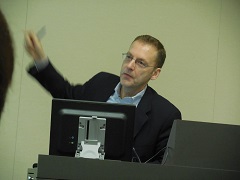
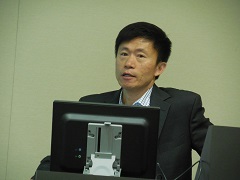
Q&A: Comments from Hiro Ito, Protland State University
質疑応答:伊藤博之(ポートランド州立大学)よりのコメント
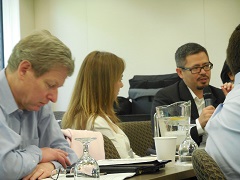
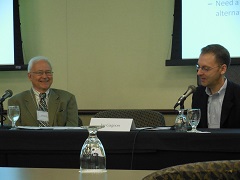
-----------------------------------------------------------------------
Program in the afternoon
Session #4
Chair: Cheng Hsia, USC
1:30-2:20pm
"Institutions and Central Bank Norm Diffusion: Abenomics and the Delayed Break with the Monetary Orthodoxy"
Presenter: Saori Katada, USC
DIscussant: Brock Blomberg, Claremont
2:40-3:30pm
"Latin America: From Financial Repression to Financial Crash and Back"
Presenter: Manuel Pastor & Carol Wise, USC
Discussant: Sebastian Edwards, UCLA
3:30-4:20pm
"International Reserves Before and After the Global Crisis: Is There No End to Hoarding?"
Presenter: Hiro Ito, Portland State University
Discussant: Yu-Chin, CHen, University of Washington
4:20-4:30pm
Closing remarks
-------------------------------------------------------------------------
Reference:
http://dornsife.usc.edu/conferences/jimf-usc-conference-2014/
JIMF (Journal of International Money and Finance)-US Conference
Orgainzed by:
Joshua Aizenman (USC), Menzie Chinn (Univ. of Washington) and Robert Dekle (USC)
Sponsored by:
USC Center for International Studies, USC School of International Relations, USC Dockson Chair in Economics and International Relations, Federal Reserve Bank of San Francisco, and the Journal of International Money and Finance
Held at: USC Davidson Conference Center


(Reported by Takahiro Miyao, USC)
Theme: "Financial Adjustment in the Aftermath of the Global Crisis: New World Order?"
テーマ:「国際金融危機以後の金融調整:新世界秩序か?」
Date: April 18-19, 2014
日程:2014年4月18日~19日
Place: USC Davidson Conference Center, Los Angeles
場所:ロサンゼルス・USCデビッドソン・コンファレンス・センター
Agenda & Papers: 内容へのリンク
http://dornsife.usc.edu/conferences/jimf-usc-conference-2014/agenda/
Report: レポート
April 19(Sat) Session #3
4月19日(土) セッション3
Chair: Jeff Nugent, USC:
チェア:ジェフ・ニュージェント(南カリフォルニア大学)
9:00-9:50am
"Japanese Monetary Policy and the Yen: Is There a 'Currency War'?"
「日本の金融政策と円:通貨戦争か?」
Pesenters: Koichi Hamada, Yale Unversity, and Robert Dekle, USC
発表者:浜田宏一(エール大学)、ロバート:ディークル(南カリフォルニア大学)


Discussant: Takeo Hoshi, Stanford Univ.: 討論者:星 岳雄(スタンフォード大学)


Q&A: Discussion from the floor: 質疑応答:参加者からの質問


Note: In response to Takahiro Miyao's question to Prof. Hamada about his possible advice to PM Abe and the BOJ in order to overcome the current doldrums in the Japanese economy, Prof. Hamada suggested that he might probably recommend a further stimulus policy (additional quantitative easing) to the government and the BOJ, but will wait until after he examines various data to assess the effects on the economy of the consumption tax rate increase, which took place on April 1.
記:現在の日本経済の低迷を乗り越えるために安倍政権と日銀にどのようなアドバイスをするかという宮尾尊弘の質問に対して、浜田教授は、おそらくもう一段の景気刺激策(追加的な量的緩和策)を勧めると思うが、当面は4月1日に実施された消費税率引き上げの経済への影響をデータでよく見極めてからにするという答えであった。
9:50-10:40am
"Official Financial Flows, Capital Controls, and Global Imbalances"
「公的な資金フロー、資本移動規制、およびグローバルな不均衡」
Presenter: Joe Gagnon, Institute for International Economics
Discussant: Zhang Liu (Federal Reserve Bank of San Francisco)
発表者:ジョー・ギャ二オン(IIE)、討論者:ジャン・リュー(FR Bank of SF)


Q&A: Comments from Hiro Ito, Protland State University
質疑応答:伊藤博之(ポートランド州立大学)よりのコメント


-----------------------------------------------------------------------
Program in the afternoon
Session #4
Chair: Cheng Hsia, USC
1:30-2:20pm
"Institutions and Central Bank Norm Diffusion: Abenomics and the Delayed Break with the Monetary Orthodoxy"
Presenter: Saori Katada, USC
DIscussant: Brock Blomberg, Claremont
2:40-3:30pm
"Latin America: From Financial Repression to Financial Crash and Back"
Presenter: Manuel Pastor & Carol Wise, USC
Discussant: Sebastian Edwards, UCLA
3:30-4:20pm
"International Reserves Before and After the Global Crisis: Is There No End to Hoarding?"
Presenter: Hiro Ito, Portland State University
Discussant: Yu-Chin, CHen, University of Washington
4:20-4:30pm
Closing remarks
-------------------------------------------------------------------------
Reference:
http://dornsife.usc.edu/conferences/jimf-usc-conference-2014/
JIMF (Journal of International Money and Finance)-US Conference
Orgainzed by:
Joshua Aizenman (USC), Menzie Chinn (Univ. of Washington) and Robert Dekle (USC)
Sponsored by:
USC Center for International Studies, USC School of International Relations, USC Dockson Chair in Economics and International Relations, Federal Reserve Bank of San Francisco, and the Journal of International Money and Finance
Held at: USC Davidson Conference Center


(Reported by Takahiro Miyao, USC)
経済教育シンポ「法教育と経済教育の対話:法と経済の考え方」 [Report]
経済教育シンポジウム「法教育と経済教育の対話その3:法と経済の考え方」
日時:2014年3月22日(土)13:30-17:00
場所:同志社大学 寧静館5階
主催:経済教育ネットワーク
後援:京都府教育委員会、京都市教育委員会、大阪市教育委員会
趣旨:(経済教育ネットワークからの「お知らせ」より)
「一昨年来、経済教育ネットワーク年次大会では、法教育と経済教育のこれまでの取り組むを振り返りながら、今後の本格的実践の方向を考えるための検討を重ねてきました。今年度はこれまでの検討をもとに、経済社会の枠組みの一つに法があるという理解に立って、高校政治経済、現代社会、中学公民で法と経済の関係をどのように教えるべきか、新たな提案を行います」
会場周辺:
しだれ桜が開花を始めたばかりの京都で開催されたシンポジウムの会場、同志社大学の入り口


プログラム
13:30-13:35 開会挨拶
司会の高橋勝也桜修館中等教育学校教諭と開会挨拶をする篠原総一同志社大学経済学部教授
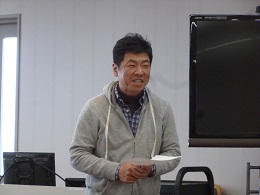
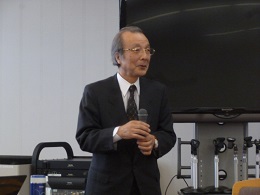
13:35-14:45 第1部 提案:法と経済の考え方
篠原総一教授による提案のプレゼンと追加的コメントをする大倉泰裕千葉県立松戸向陽高校教諭
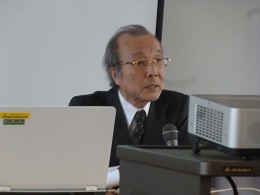
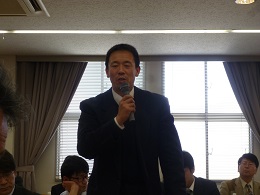
14:50-16:50 第2部 パネルディスカッション:法と経済をどう考えるか
コーディネーター 中川雅之日本大学経済学部教授、パネリスト(左より)野坂佳生金沢大学大学院法務研究科教授、藤井剛千葉県立千葉工業高校教諭、兼間昌智札幌市立定山渓中学教頭
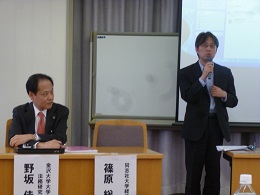
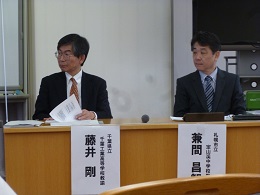
会場の参加者からパネリストへの質問とコメント
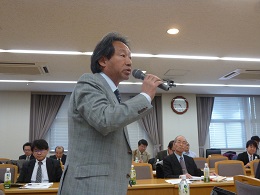
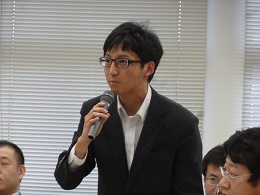
中川雅之教授によるディスカッション総括と西村理同志社大学教授の閉会挨拶
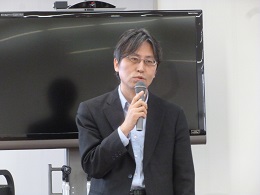
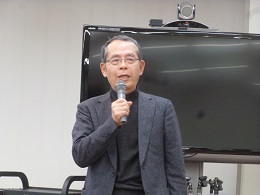
レポート:
前2回の経済教育シンポジウムでの成果を踏まえて(それらの内容については巻末の「参考」の欄を参照)、今回のシンポジウム「経済教育と法教育の対話第3弾」では、「法と経済との考え方」および「法教育と経済教育の関係」を、教育の現場でどう扱って教えていくべきかについて、具体的な提案や実践例が示されるとともに、重要な問題点もいくつか指摘された。
まず第1部の「提案:法と経済の考え方」については、経済教育ネットワーク代表の篠原総一同志社大学教授から、「『仕組み』で学ぶ法と経済」というテーマで、経済社会を教える場合について提案があった。それは、そもそも中学や高校の「経済社会」で目指すものは、社会の「仕組み」(成り立ち)を理解し、その仕組みがうまく機能しているかどうかを考えることであるとして、その仕組みのうち特に「分業と交換」に焦点を当てて、何を教えるべきかについて具体的な内容の提案があった。
例えば、市場の仕組みについて、自由な取引を支える条件としての法の目的などについて、教科書でもっとよく説明する必要性が指摘された。
結論として、社会の仕組みや成り立ちを学ぶには、社会の経済的な側面も法的な側面も知る必要があり、経済教育と法教育など多面的な相互理解と共同作業が欠かせないという点であった。
それを受けて、大倉泰裕千葉県立松戸向陽高校教諭より、基本的に賛同のコメントが述べられ、経済学や法学といった縦割りの切り分けではなく、経済、法、政治、倫理などすべてを関連付けて初めて、この世の中、社会が理解できて、社会を読み解く力がつくものであることが強調された。
次に第2部のパネルディスカッション「法教育と経済教育の対話その3」では、まずコーディネーターである中川雅之日本大学教授から、過去2回のシンポジウムの概要と結論のレビューがあり、その上で各パネリストがそれぞれの立場から法と経済の教え方の実践例を中心にプレゼンがあった。
まず、日弁連の弁護士である野坂佳生金沢大学法科大学院教授は、法原理教育の社会科的な意味を説明した後に、具体的に中学の社会科の授業において「環境税の負担」に関する効率と公正を解説するためのゲストティーチャーの役割を果したことの説明があった。
また、藤井剛千葉県立千葉工業高校教諭は、高校での法と経済の教え方について、法教育も経済教育も、社会科教育の一環という意味では目的は同じであることを強調。その上で、現行の法教育のあり方について、以前のシンポジウムでも指摘があった条文などの「丸暗記」への疑問を提示するとともに、今回提案されたような教科書や教材が法教育の側でも必要であることを指摘し、その点で両分野の提携を呼びかけた。
さらに、兼間昌智札幌市立定山渓中学教頭は、中学で法教育と経済教育をどう教えるかについて、一方において一部で思った以上に経済的な見方を生かした授業や試験問題が見られるようになってきたが、他方では依然として教師が経済や経済学を学んでおらず、またその機会もないため、新しい動きが経済教育にも法教育にも生かされていない点を強調した。最後にパネリスト全員が共通に指摘した問題点として、法教育における制度や条文を暗記する傾向と、経済の専門の側から教育現場への働きかけやサービスの提供の不足・欠如があった。
その後の質疑応答では、実践型の授業における効果や評価のあり方の問題、さらに法と経済の見方に加えて教育学、教育実践の分野との交流の進め方などについての議論があり、最後はシンポジウム全体をまとめて問題点や今後の課題も再確認した中川教授の総括、および西村理同志社大学教授による挨拶があって、無事閉会となった。
今回のシンポジウムの評価については、いうまでもなくそれぞれの立場で異なると思われるが、総じて今回は前2回に比べると、法教育と経済教育の間の理解が進み、距離が縮まった感があり、その意味では明らかに前進が見られた。
しかし、時折相手の分野の考え方や見方の実体をよく理解しないままに、お互いを取り入れるべき、近寄るべきという議論に流れる面がなきにしもあらずであった。もちろんお互いを知らずに反目する段階から大いなる進歩といえるが、より重要なことはお互いの実体をよりよく知ることである。そうでないと、依然として実際に反目している者たちがなぜいるのか、なぜそうなのか、その根本的な理由は何かといった重要なポイントを見失う恐れがある。これについてもう一度原点に戻って見直して、より根本的な違いを理解した上で、それを超える相互理解と相互協力への道を見つけることが必要ではないかとも感じさせた。
今後、第4段、第5段への期待がますます高まった今回のシンポジウムであった。関係者各位のご苦労、ご努力を高く評価し、感謝の意を表したい。
(文責:宮尾尊弘筑波大学名誉教授)
----------------------------------------------------------------------------
参考:
経済教育シンポジウム「経済教育と法教育の対話その2:労働問題」
http://miyao-blog.blog.so-net.ne.jp/2013-03-23
経済教育シンポジウム「経済教育と法教育の対話(その1)」
http://miyao-blog.blog.so-net.ne.jp/2011-12-04
経済教育ネットワークHP:
http://www.econ-edu.net/
日時:2014年3月22日(土)13:30-17:00
場所:同志社大学 寧静館5階
主催:経済教育ネットワーク
後援:京都府教育委員会、京都市教育委員会、大阪市教育委員会
趣旨:(経済教育ネットワークからの「お知らせ」より)
「一昨年来、経済教育ネットワーク年次大会では、法教育と経済教育のこれまでの取り組むを振り返りながら、今後の本格的実践の方向を考えるための検討を重ねてきました。今年度はこれまでの検討をもとに、経済社会の枠組みの一つに法があるという理解に立って、高校政治経済、現代社会、中学公民で法と経済の関係をどのように教えるべきか、新たな提案を行います」
会場周辺:
しだれ桜が開花を始めたばかりの京都で開催されたシンポジウムの会場、同志社大学の入り口


プログラム
13:30-13:35 開会挨拶
司会の高橋勝也桜修館中等教育学校教諭と開会挨拶をする篠原総一同志社大学経済学部教授


13:35-14:45 第1部 提案:法と経済の考え方
篠原総一教授による提案のプレゼンと追加的コメントをする大倉泰裕千葉県立松戸向陽高校教諭


14:50-16:50 第2部 パネルディスカッション:法と経済をどう考えるか
コーディネーター 中川雅之日本大学経済学部教授、パネリスト(左より)野坂佳生金沢大学大学院法務研究科教授、藤井剛千葉県立千葉工業高校教諭、兼間昌智札幌市立定山渓中学教頭


会場の参加者からパネリストへの質問とコメント


中川雅之教授によるディスカッション総括と西村理同志社大学教授の閉会挨拶


レポート:
前2回の経済教育シンポジウムでの成果を踏まえて(それらの内容については巻末の「参考」の欄を参照)、今回のシンポジウム「経済教育と法教育の対話第3弾」では、「法と経済との考え方」および「法教育と経済教育の関係」を、教育の現場でどう扱って教えていくべきかについて、具体的な提案や実践例が示されるとともに、重要な問題点もいくつか指摘された。
まず第1部の「提案:法と経済の考え方」については、経済教育ネットワーク代表の篠原総一同志社大学教授から、「『仕組み』で学ぶ法と経済」というテーマで、経済社会を教える場合について提案があった。それは、そもそも中学や高校の「経済社会」で目指すものは、社会の「仕組み」(成り立ち)を理解し、その仕組みがうまく機能しているかどうかを考えることであるとして、その仕組みのうち特に「分業と交換」に焦点を当てて、何を教えるべきかについて具体的な内容の提案があった。
例えば、市場の仕組みについて、自由な取引を支える条件としての法の目的などについて、教科書でもっとよく説明する必要性が指摘された。
結論として、社会の仕組みや成り立ちを学ぶには、社会の経済的な側面も法的な側面も知る必要があり、経済教育と法教育など多面的な相互理解と共同作業が欠かせないという点であった。
それを受けて、大倉泰裕千葉県立松戸向陽高校教諭より、基本的に賛同のコメントが述べられ、経済学や法学といった縦割りの切り分けではなく、経済、法、政治、倫理などすべてを関連付けて初めて、この世の中、社会が理解できて、社会を読み解く力がつくものであることが強調された。
次に第2部のパネルディスカッション「法教育と経済教育の対話その3」では、まずコーディネーターである中川雅之日本大学教授から、過去2回のシンポジウムの概要と結論のレビューがあり、その上で各パネリストがそれぞれの立場から法と経済の教え方の実践例を中心にプレゼンがあった。
まず、日弁連の弁護士である野坂佳生金沢大学法科大学院教授は、法原理教育の社会科的な意味を説明した後に、具体的に中学の社会科の授業において「環境税の負担」に関する効率と公正を解説するためのゲストティーチャーの役割を果したことの説明があった。
また、藤井剛千葉県立千葉工業高校教諭は、高校での法と経済の教え方について、法教育も経済教育も、社会科教育の一環という意味では目的は同じであることを強調。その上で、現行の法教育のあり方について、以前のシンポジウムでも指摘があった条文などの「丸暗記」への疑問を提示するとともに、今回提案されたような教科書や教材が法教育の側でも必要であることを指摘し、その点で両分野の提携を呼びかけた。
さらに、兼間昌智札幌市立定山渓中学教頭は、中学で法教育と経済教育をどう教えるかについて、一方において一部で思った以上に経済的な見方を生かした授業や試験問題が見られるようになってきたが、他方では依然として教師が経済や経済学を学んでおらず、またその機会もないため、新しい動きが経済教育にも法教育にも生かされていない点を強調した。最後にパネリスト全員が共通に指摘した問題点として、法教育における制度や条文を暗記する傾向と、経済の専門の側から教育現場への働きかけやサービスの提供の不足・欠如があった。
その後の質疑応答では、実践型の授業における効果や評価のあり方の問題、さらに法と経済の見方に加えて教育学、教育実践の分野との交流の進め方などについての議論があり、最後はシンポジウム全体をまとめて問題点や今後の課題も再確認した中川教授の総括、および西村理同志社大学教授による挨拶があって、無事閉会となった。
今回のシンポジウムの評価については、いうまでもなくそれぞれの立場で異なると思われるが、総じて今回は前2回に比べると、法教育と経済教育の間の理解が進み、距離が縮まった感があり、その意味では明らかに前進が見られた。
しかし、時折相手の分野の考え方や見方の実体をよく理解しないままに、お互いを取り入れるべき、近寄るべきという議論に流れる面がなきにしもあらずであった。もちろんお互いを知らずに反目する段階から大いなる進歩といえるが、より重要なことはお互いの実体をよりよく知ることである。そうでないと、依然として実際に反目している者たちがなぜいるのか、なぜそうなのか、その根本的な理由は何かといった重要なポイントを見失う恐れがある。これについてもう一度原点に戻って見直して、より根本的な違いを理解した上で、それを超える相互理解と相互協力への道を見つけることが必要ではないかとも感じさせた。
今後、第4段、第5段への期待がますます高まった今回のシンポジウムであった。関係者各位のご苦労、ご努力を高く評価し、感謝の意を表したい。
(文責:宮尾尊弘筑波大学名誉教授)
----------------------------------------------------------------------------
参考:
経済教育シンポジウム「経済教育と法教育の対話その2:労働問題」
http://miyao-blog.blog.so-net.ne.jp/2013-03-23
経済教育シンポジウム「経済教育と法教育の対話(その1)」
http://miyao-blog.blog.so-net.ne.jp/2011-12-04
経済教育ネットワークHP:
http://www.econ-edu.net/
経済教育シンポジウム「経済教育と法教育の対話 その2:労働問題」 [Report]
経済教育シンポジウム「経済教育と法教育の対話 その2:労働問題」
シンポジウム「経済教育と法教育の対話 その2:労働問題」:
日時:2013年3月23日(土)13:00-17:00
会場:同志社大学 寒梅館 地下A会議室
趣旨:「前回の経済教育ネットワーク年次大会では、法教育と経済教育のこれまでの取り組むを振り返りながら、今後の本格的実践の方向を考えるための取り組みがなされました。今年度はそれをもとに、高校教科書で扱われている労働問題をテーマに子供たちに何を伝えるべきか、どのように実践教育をするかをさらに掘り下げて取り上げます」
しだれ桜が満開の京都で開催されたシンポジウムの会場、同志社大学寒梅館

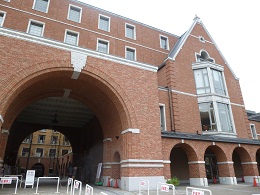
篠原総一同志社大学教授による開会挨拶と中川雅之日本大学教授による冒頭のプレゼンとまとめ
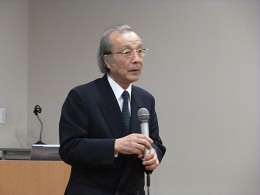
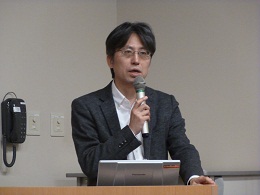
講演:教科書「現代社会」における労働問題のとらえ方
「経済学からみた労働問題のとらえ方」対「法教育からみた労働問題のとらえ方」
安藤至大日本大学大学院総合科学研究科准教授と野川忍明治大学大学院教授
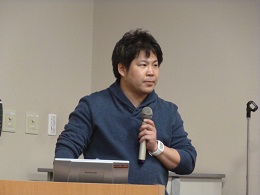
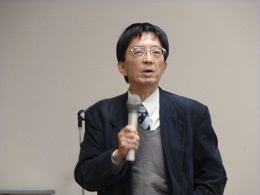
パネリストによる「実践から」のコメント
吉田英文生野高等学校教諭と関本祐希大阪府立交野支援学校四條畷校教諭
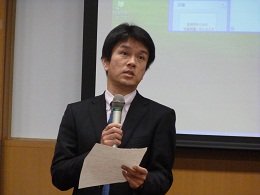
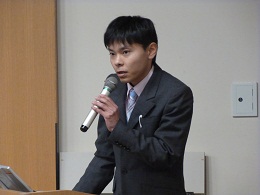
パネルディスカッション:「『労働問題』によって子供たちに伝えたいこと」
コーディネーター:中川雅之教授
パネリスト:関本祐希教諭、吉田英文教諭、安藤至大准教授、野川忍教授
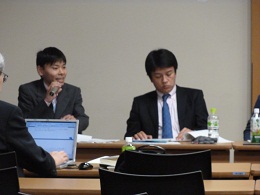
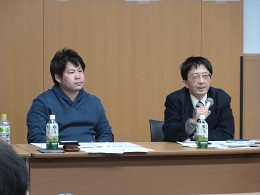
会場の参加者からパネリストへの質問とコメント
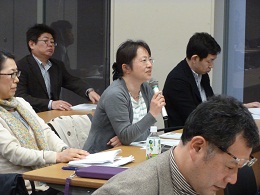
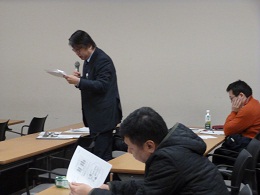
中川雅之教授によるディスカッション総括と西村理同志社大学教授の閉会挨拶
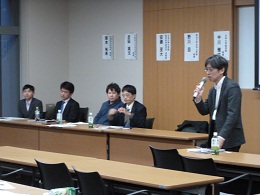
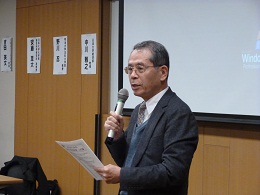
レポート:
経済教育ネットワークが追及している経済教育と法教育をいかに総合的に生徒たちに教えるかという問題について、今回は「労働問題」を中心課題にすえて経済学と法学の両方からの見方を取り上げ、その共通点と相違点を浮き彫りにする試みであった。
その相違点を強調する意味で、普段からウェブ上で論争を続けている安藤至大准教授と野川忍教授がそれぞれの持論を展開したのは、大変興味深いものであった。特に、前者の経済学的な見方を取る立場では、労働問題は、理論的には他の市場の持つ問題と同様に分析できるとするのに対して、後者の法学的な見方を取る立場では、労働問題は、労働市場の持つ本質的な特殊性(例えば、労働サービスと労働者とが分離できないこと)から起こるものであり、そのために他の市場にはない最低賃金や労働組合といった制度が存在し正当化できるとする。
取り仕切り役の中川雅之教授はこの極端に異なるそれぞれの立場を尊重しつつ、何とか経済教育と法教育を統合して生徒たちに教える枠組みを提案する一方で、重要な結論として、現在の高校の教科書での労働問題の扱いは多くの法律や制度が恣意的に列挙されているだけで、その背景にある体系や考え方が説明されていないことが問題であると指摘した。
これに対して、現場での実践の立場から、吉田英文教諭は、教科書はあくまで必要最小限の事実や事柄の説明にとどめざるをえず、その背景にある考え方などは、教師が生徒の興味やニーズに合わせて工夫して教えるのが適切ではないかという考え方を表明した。一方、関本祐希教諭は、基本的な考え方を生徒に教えるメリットを認め、その立場から法教育と経済教育の両方をできるだけ統合して教える具体的なプログラムの例を示した。
その後のパネルディスカッションでは、それ以上の議論の深まりはなかったものの、単なる暗記だけを奨励するような教科書の内容を少なくとも側面から補完して、基本的な考え方をどう教えたらいいかを示す教材やマニュアルなどを経済教育ネットワークが中心となって作成すべきという中川教授の提案には、すべての参加者が賛成したようにみえた。これまでの2つのシンポジウムを踏まえて、次の第3弾がより実り多いものになることが期待される。
(宮尾尊弘筑波大学名誉教授)
参考:
経済教育ネットワーク2011年度年次大会@同志社大学
シンポジウム「経済教育と法教育の対話」:
http://miyao-blog.blog.so-net.ne.jp/2011-12-04
経済教育ネットワークHP:
http://www.econ-edu.net/
シンポジウム「経済教育と法教育の対話 その2:労働問題」:
日時:2013年3月23日(土)13:00-17:00
会場:同志社大学 寒梅館 地下A会議室
趣旨:「前回の経済教育ネットワーク年次大会では、法教育と経済教育のこれまでの取り組むを振り返りながら、今後の本格的実践の方向を考えるための取り組みがなされました。今年度はそれをもとに、高校教科書で扱われている労働問題をテーマに子供たちに何を伝えるべきか、どのように実践教育をするかをさらに掘り下げて取り上げます」
しだれ桜が満開の京都で開催されたシンポジウムの会場、同志社大学寒梅館


篠原総一同志社大学教授による開会挨拶と中川雅之日本大学教授による冒頭のプレゼンとまとめ


講演:教科書「現代社会」における労働問題のとらえ方
「経済学からみた労働問題のとらえ方」対「法教育からみた労働問題のとらえ方」
安藤至大日本大学大学院総合科学研究科准教授と野川忍明治大学大学院教授


パネリストによる「実践から」のコメント
吉田英文生野高等学校教諭と関本祐希大阪府立交野支援学校四條畷校教諭


パネルディスカッション:「『労働問題』によって子供たちに伝えたいこと」
コーディネーター:中川雅之教授
パネリスト:関本祐希教諭、吉田英文教諭、安藤至大准教授、野川忍教授


会場の参加者からパネリストへの質問とコメント


中川雅之教授によるディスカッション総括と西村理同志社大学教授の閉会挨拶


レポート:
経済教育ネットワークが追及している経済教育と法教育をいかに総合的に生徒たちに教えるかという問題について、今回は「労働問題」を中心課題にすえて経済学と法学の両方からの見方を取り上げ、その共通点と相違点を浮き彫りにする試みであった。
その相違点を強調する意味で、普段からウェブ上で論争を続けている安藤至大准教授と野川忍教授がそれぞれの持論を展開したのは、大変興味深いものであった。特に、前者の経済学的な見方を取る立場では、労働問題は、理論的には他の市場の持つ問題と同様に分析できるとするのに対して、後者の法学的な見方を取る立場では、労働問題は、労働市場の持つ本質的な特殊性(例えば、労働サービスと労働者とが分離できないこと)から起こるものであり、そのために他の市場にはない最低賃金や労働組合といった制度が存在し正当化できるとする。
取り仕切り役の中川雅之教授はこの極端に異なるそれぞれの立場を尊重しつつ、何とか経済教育と法教育を統合して生徒たちに教える枠組みを提案する一方で、重要な結論として、現在の高校の教科書での労働問題の扱いは多くの法律や制度が恣意的に列挙されているだけで、その背景にある体系や考え方が説明されていないことが問題であると指摘した。
これに対して、現場での実践の立場から、吉田英文教諭は、教科書はあくまで必要最小限の事実や事柄の説明にとどめざるをえず、その背景にある考え方などは、教師が生徒の興味やニーズに合わせて工夫して教えるのが適切ではないかという考え方を表明した。一方、関本祐希教諭は、基本的な考え方を生徒に教えるメリットを認め、その立場から法教育と経済教育の両方をできるだけ統合して教える具体的なプログラムの例を示した。
その後のパネルディスカッションでは、それ以上の議論の深まりはなかったものの、単なる暗記だけを奨励するような教科書の内容を少なくとも側面から補完して、基本的な考え方をどう教えたらいいかを示す教材やマニュアルなどを経済教育ネットワークが中心となって作成すべきという中川教授の提案には、すべての参加者が賛成したようにみえた。これまでの2つのシンポジウムを踏まえて、次の第3弾がより実り多いものになることが期待される。
(宮尾尊弘筑波大学名誉教授)
参考:
経済教育ネットワーク2011年度年次大会@同志社大学
シンポジウム「経済教育と法教育の対話」:
http://miyao-blog.blog.so-net.ne.jp/2011-12-04
経済教育ネットワークHP:
http://www.econ-edu.net/
Akita Art Project: あきたアートプロジェクト「物見遊山」 [Report]
Akita Art Project: あきたアートプロジェクト「物見遊山」
Exhibition of Artistic Works by Local Artists in Central Akita City
秋田市中心部における地元アーティストによるアートの展示
「物見遊山」― まちとアートの遊覧企画
Period: October 23 - November 11, 2012: 期間:10月23日~11月11日
Komatsu Craft Space, displaying various arts: 「小松クラフトスペース」の店内


Exhibition of Wood Artist Joe Fujita: 木工造形作家・藤田丈の作品展


Neighboring Shops in Akita City: 秋田市の周辺の店


Commercial arts with humor: ユーモラスなコマーシャルアート


Akita Art Project Poster near Akita Station: 秋田駅前の「あきたアート」のポスター


Train Exhibition at Akita Station: 秋田駅内の展示:

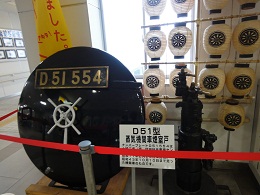
References: 参考:
Akita Art Project: あきたアートプロジェクト:
http://akita-art-project.net/?p=697
Akita Prefecture Official Website: 秋田県公式ウェブサイト:
http://www.pref.akita.lg.jp/www/contents/1350959801750/
---------------------------------------------------------------------------
Exhibition of Artistic Works by Local Artists in Central Akita City
秋田市中心部における地元アーティストによるアートの展示
「物見遊山」― まちとアートの遊覧企画
Period: October 23 - November 11, 2012: 期間:10月23日~11月11日
Komatsu Craft Space, displaying various arts: 「小松クラフトスペース」の店内


Exhibition of Wood Artist Joe Fujita: 木工造形作家・藤田丈の作品展


Neighboring Shops in Akita City: 秋田市の周辺の店


Commercial arts with humor: ユーモラスなコマーシャルアート


Akita Art Project Poster near Akita Station: 秋田駅前の「あきたアート」のポスター


Train Exhibition at Akita Station: 秋田駅内の展示:


References: 参考:
Akita Art Project: あきたアートプロジェクト:
http://akita-art-project.net/?p=697
Akita Prefecture Official Website: 秋田県公式ウェブサイト:
http://www.pref.akita.lg.jp/www/contents/1350959801750/
---------------------------------------------------------------------------
Mr. Tokuhide Niimi's Special Lecture@AIU [Report]
Mr. Tokuhide Niimi's Special Lecture@AIU
Lecturer: Maestro Niimi Tokuhide
Topic: "Part and Whole: A Japanese Composer's Reflections on Culture, Music, and the Cosmos"
Date/Time: November 2, 2012, 6pm
Place: Lecture Hall, AIU
Prof. Don Nilson and Prof. Reiko Watanabe jointly introducing Mr. Niimi
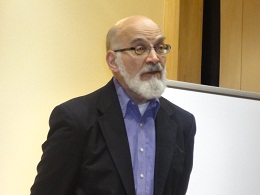
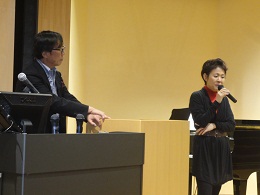
Mr. Niimi's lecture on the principle of the cosmos and spiral movement
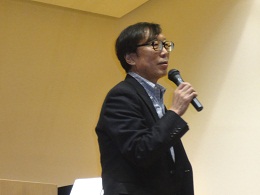
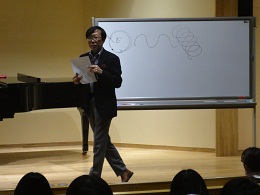
Mr. Niimi's performance to play a short theme as a part of the whole
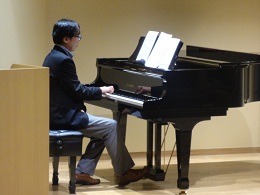
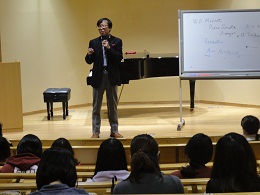
Toward the end, the participants enjoyed listening to Mr. Niimi's contemporary music "Sonitus Vitalis": Concerto for Violin and Orchestra, recording of performance by Prof. Reiko Watanabe and the Sendai Philharmonic Orchestra with R. Terashima conducting.
--------------------------------------------------------------------
Lecturer: Maestro Niimi Tokuhide
Topic: "Part and Whole: A Japanese Composer's Reflections on Culture, Music, and the Cosmos"
Date/Time: November 2, 2012, 6pm
Place: Lecture Hall, AIU
Prof. Don Nilson and Prof. Reiko Watanabe jointly introducing Mr. Niimi


Mr. Niimi's lecture on the principle of the cosmos and spiral movement


Mr. Niimi's performance to play a short theme as a part of the whole


Toward the end, the participants enjoyed listening to Mr. Niimi's contemporary music "Sonitus Vitalis": Concerto for Violin and Orchestra, recording of performance by Prof. Reiko Watanabe and the Sendai Philharmonic Orchestra with R. Terashima conducting.
--------------------------------------------------------------------
Behavioral Economics-Class Experiment 行動経済学-クラス実験 [Report]
Behavioral Economics-Class Experiment: 行動経済学-クラス実験
Behavioral Economics - Class Experiment (Date: 10/18/2012)
Place: Akita International University
Course: Global Business; (ECN322) Economics of Globalization
Class Experiment on Anchoring Effect:
People’s choice behavior is strongly influenced by completely unrelated information (as an anchor), which they hear or see just before the choice.
An experiment designed to produce such a result is as follows:
Step 1:
In class, students are asked to write down the last 3 digits of their ID number, and are told that the 3 digit number (yen) is the price of a product which is to be shown in the next step.
Step 2:
A certain product is shown to the students and they are asked if they would buy that good if its price equals the amount (yen) above in Step 1.
Step 3:
Regardless of the number given to them in Step 1 and their answer to the question in Step 2, the students are asked what the maximum amount they would be willing to pay for that good, according to their own preference.
Expected result:
Step 1 and Step 3 are likely to be correlated (Step 2 is irrelevant) in such a way that on average the greater the last 3 digit number in Step 1, the higher the maximum amount that they would be willing to pay in Step 3, that is, they are likely to be influenced by randomly assigned numbers.
Actual result in class:
Student..ID number..Maximum........Student..ID number..Maximum
(1).........132...........150..............(9)........ 574..........1,500
(2).........181...........300..............(10).......590.............400
(3).........300...........400..............(11).......628..........1,000
(4).........301........1,100..............(12).......694..........1,500
(5).........318...........210..............(13).......697..........1,200
(6).........425...........450..............(14).......754.............450
(7).........433...........420..............(15).......834.............300
(8).........454...........500
Conclusion:
Actually, it seems on average the greater the ID number, the higher the maximum amount they would be willing to pay, due to the anchoring effect.
(Takahiro Miyao)
--------------------------------------------------------------------------
行動経済学 – クラスでの実験(実施日: 10/18/2012)
場所:国際教養大学(秋田県)
コース:グローバルビジネス課程(学部) ECN322 「グローバル化の経済学」
アンカー効果に関するクラスでの実験:
人間の選択行為は、それがまったく無関係なものであっても選択の直前に見聞きした情報によって、大きく影響される傾向がある。
このような結果を生み出すように工夫された実験は以下の通り:
ステップ1:
クラスで学生たちに、自分のID(学籍)番号の最後の3桁を紙に書かせて、その額(円)が次のステップで提示される物の価格であると説明する。
ステップ2:
ある物を学生たちに示して、もしその価格が上のステップ1で与えられた値に等しい場合、それを学生たちが買いたいかどうか尋ねる。
ステップ3:
以上のステップ1での数字やステップ2の答えとは関係なく、学生たちに自分の選好みに従って、その物に対して最大限いくらまでならばお金を払って買いたいと思うかを尋ねる。
予想される結果:
ステップ1とステップ3は関連しており(ステップ2は意味のない質問)、平均すると、ステップ1で与えられた数字が大きければ大きいほど、ステップ3の最大限払ってもいいと思う額も大きくなる傾向がある。つまり、ランダムに与えられた数字がその後の選択に影響を及ぼす可能性が高い。
クラスでの実験結果:
学生......ID番号....最大限度支払額......学生......ID番号....最大限度支払額
(1).........132...........150..............(9)........ 574..........1,500
(2).........181...........300..............(10).......590.............400
(3).........300...........400..............(11).......628..........1,000
(4).........301........1,100..............(12).......694..........1,500
(5).........318...........210..............(13).......697..........1,200
(6).........425...........450..............(14).......754.............450
(7).........433...........420..............(15).......834.............300
(8).........454...........500
結論:
実際に、アンカー効果によって、平均するとID番号が大きくなればなるほど、最大限払ってもいいと思う額も大きくなる傾向があるようにみえる。
(宮尾)
------------------------------------------------------------------------------
Behavioral Economics - Class Experiment (Date: 10/18/2012)
Place: Akita International University
Course: Global Business; (ECN322) Economics of Globalization
Class Experiment on Anchoring Effect:
People’s choice behavior is strongly influenced by completely unrelated information (as an anchor), which they hear or see just before the choice.
An experiment designed to produce such a result is as follows:
Step 1:
In class, students are asked to write down the last 3 digits of their ID number, and are told that the 3 digit number (yen) is the price of a product which is to be shown in the next step.
Step 2:
A certain product is shown to the students and they are asked if they would buy that good if its price equals the amount (yen) above in Step 1.
Step 3:
Regardless of the number given to them in Step 1 and their answer to the question in Step 2, the students are asked what the maximum amount they would be willing to pay for that good, according to their own preference.
Expected result:
Step 1 and Step 3 are likely to be correlated (Step 2 is irrelevant) in such a way that on average the greater the last 3 digit number in Step 1, the higher the maximum amount that they would be willing to pay in Step 3, that is, they are likely to be influenced by randomly assigned numbers.
Actual result in class:
Student..ID number..Maximum........Student..ID number..Maximum
(1).........132...........150..............(9)........ 574..........1,500
(2).........181...........300..............(10).......590.............400
(3).........300...........400..............(11).......628..........1,000
(4).........301........1,100..............(12).......694..........1,500
(5).........318...........210..............(13).......697..........1,200
(6).........425...........450..............(14).......754.............450
(7).........433...........420..............(15).......834.............300
(8).........454...........500
Conclusion:
Actually, it seems on average the greater the ID number, the higher the maximum amount they would be willing to pay, due to the anchoring effect.
(Takahiro Miyao)
--------------------------------------------------------------------------
行動経済学 – クラスでの実験(実施日: 10/18/2012)
場所:国際教養大学(秋田県)
コース:グローバルビジネス課程(学部) ECN322 「グローバル化の経済学」
アンカー効果に関するクラスでの実験:
人間の選択行為は、それがまったく無関係なものであっても選択の直前に見聞きした情報によって、大きく影響される傾向がある。
このような結果を生み出すように工夫された実験は以下の通り:
ステップ1:
クラスで学生たちに、自分のID(学籍)番号の最後の3桁を紙に書かせて、その額(円)が次のステップで提示される物の価格であると説明する。
ステップ2:
ある物を学生たちに示して、もしその価格が上のステップ1で与えられた値に等しい場合、それを学生たちが買いたいかどうか尋ねる。
ステップ3:
以上のステップ1での数字やステップ2の答えとは関係なく、学生たちに自分の選好みに従って、その物に対して最大限いくらまでならばお金を払って買いたいと思うかを尋ねる。
予想される結果:
ステップ1とステップ3は関連しており(ステップ2は意味のない質問)、平均すると、ステップ1で与えられた数字が大きければ大きいほど、ステップ3の最大限払ってもいいと思う額も大きくなる傾向がある。つまり、ランダムに与えられた数字がその後の選択に影響を及ぼす可能性が高い。
クラスでの実験結果:
学生......ID番号....最大限度支払額......学生......ID番号....最大限度支払額
(1).........132...........150..............(9)........ 574..........1,500
(2).........181...........300..............(10).......590.............400
(3).........300...........400..............(11).......628..........1,000
(4).........301........1,100..............(12).......694..........1,500
(5).........318...........210..............(13).......697..........1,200
(6).........425...........450..............(14).......754.............450
(7).........433...........420..............(15).......834.............300
(8).........454...........500
結論:
実際に、アンカー効果によって、平均するとID番号が大きくなればなるほど、最大限払ってもいいと思う額も大きくなる傾向があるようにみえる。
(宮尾)
------------------------------------------------------------------------------
UHHA Symposium@Haneda Airport: UHHAシンポジウム@羽田空港 [Report]
1st UHHA Symposium@Haneda Airport: 第1回UHHAシンポジウム@羽田空港
Date/Time: October 15(M) 10:30-17:05:
日時:2012年10月15日(月)10:30-17:05
Place: Haneda Airport First Terminal, 6th floor, Galaxy Hall:
場所:羽田空港第1旅客ターミナル6F ギャラクシーホール
Theme: "What is the maturity of civilized society?":
テーマ:「文明社会の成熟とは」

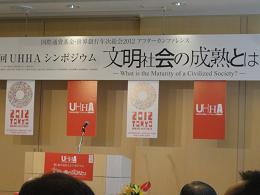
UHHA Executive Committee Chair, AIU President Mineo Nakajima's Address
UHHAエグゼクティブ・コミティー座長・中嶋嶺雄AIU学長の開会挨拶(VTRによる)
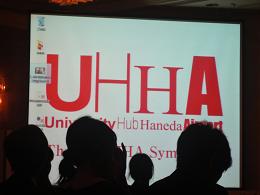
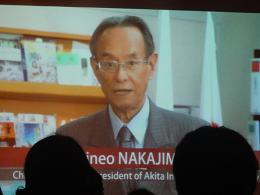
Moderator, AIU Prof. Hiroya Ichikawa and Vice Chair Isao Takashiro's Address
市川博也AIU教授による総合司会と鷹城勲副座長(日本空港ビルディング社長)の挨拶
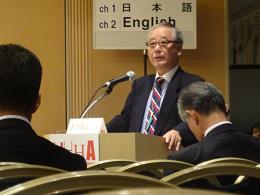
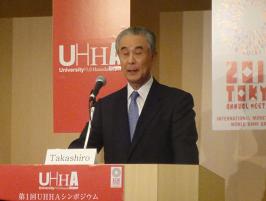
Ms. Sri Mulyani Indrawati's Lecture and Discussion Moderator Mr. Shigeo Katsu
スリ・ムルヤニ・インドラワティ世界銀行専務理事の特別講演とパネル討論司会者の勝茂夫氏
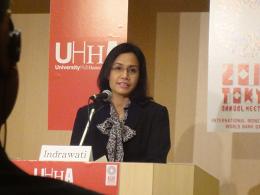
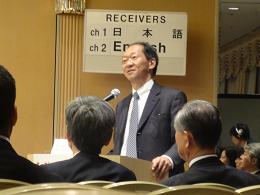
Panel discussion chaired by Mr. Shigeo Katsu with Ms. Indrawati as a panelist
パネルディスカッション:モデレーター勝茂夫氏、パネリスト・インドラワティ氏および以下4名
Other discussants (from left to right):
Ms. Miwa Kobayashi, Mr. Glen Fukushima, Ms. Reiko Kuroda, Ms. Kumiko Bando
小林美和(ボーイング) グレン・フクシマ(G&S) 黒田玲子(東大) 坂東久美子(文科省)
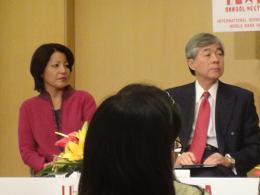
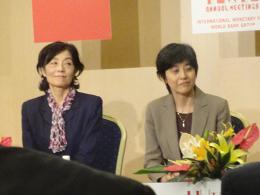
Recorded live broadcast:
インターネットによるライブ(録画)配信:
Part 1 (Morning session shown above): 午前のセッション(上記)
http://www.ustream.tv/recorded/26161707
Part 2 (Afternoon session): 午後のセッション
http://www.ustream.tv/recorded/26164311
(Reported by T. Miyao: 文責:宮尾)
----------------------------------------------------------------------------
Date/Time: October 15(M) 10:30-17:05:
日時:2012年10月15日(月)10:30-17:05
Place: Haneda Airport First Terminal, 6th floor, Galaxy Hall:
場所:羽田空港第1旅客ターミナル6F ギャラクシーホール
Theme: "What is the maturity of civilized society?":
テーマ:「文明社会の成熟とは」


UHHA Executive Committee Chair, AIU President Mineo Nakajima's Address
UHHAエグゼクティブ・コミティー座長・中嶋嶺雄AIU学長の開会挨拶(VTRによる)


Moderator, AIU Prof. Hiroya Ichikawa and Vice Chair Isao Takashiro's Address
市川博也AIU教授による総合司会と鷹城勲副座長(日本空港ビルディング社長)の挨拶


Ms. Sri Mulyani Indrawati's Lecture and Discussion Moderator Mr. Shigeo Katsu
スリ・ムルヤニ・インドラワティ世界銀行専務理事の特別講演とパネル討論司会者の勝茂夫氏


Panel discussion chaired by Mr. Shigeo Katsu with Ms. Indrawati as a panelist
パネルディスカッション:モデレーター勝茂夫氏、パネリスト・インドラワティ氏および以下4名
Other discussants (from left to right):
Ms. Miwa Kobayashi, Mr. Glen Fukushima, Ms. Reiko Kuroda, Ms. Kumiko Bando
小林美和(ボーイング) グレン・フクシマ(G&S) 黒田玲子(東大) 坂東久美子(文科省)


Recorded live broadcast:
インターネットによるライブ(録画)配信:
Part 1 (Morning session shown above): 午前のセッション(上記)
http://www.ustream.tv/recorded/26161707
Part 2 (Afternoon session): 午後のセッション
http://www.ustream.tv/recorded/26164311
(Reported by T. Miyao: 文責:宮尾)
----------------------------------------------------------------------------
Prof Drifte's Special Lecture@AIU: ドリフテ教授特別講義@国際教養大 [Report]
Prof. Reinhard Drifte's Special Lecture@Akita Int'l University
ラインハルト・ドリフテ教授の特別講義@国際教養大学
CEAR (Center for East Asia Research) Special Lecture
東アジア調査研究センター・特別講義
Date/Time: 9/28(F), 15:30-16:45:
日時 2012年9月28日(金)15:30-16:45
Place: Akita Int'l Univ, Building D, Lecture Hall:
場所 国際教養大学D棟レクチャーホール
Speaker: Reinhard Drifte (Emeritus Professor, Newcastle University, UK; Visiting Professor, Pau University, France):
講演者:ラインハルト・ドリフテ(英ニューカッスル大学名誉教授、仏ポウ大学客員教授)
Topic: Japan and China: Managing rivalry, competition and conflict:
演題:日本と中国ーライバル関係、競争および対立の克服へ
Prof. Drifte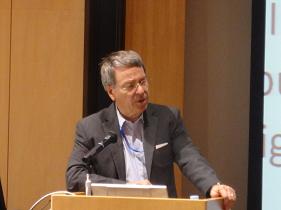 ドリフテ教授
ドリフテ教授
Summary in English:
Professor Drifte's speech on Japan and China was very timely in view of the current dispute over the Senkaku islands and the 40th anniversary of the resumption of diplomatic ties between the two countries. He explained various obstacles to the establishment of "normal" relations" between Japan and China, and examined a number of possible scenarios for the future of their relationship.
His speech seemed to be quite instructive and informative to those students who are interested in the past history and current development of Japan-China relations, although at times there were unsatisfactory explanations and stereotype descriptions of some aspects of Japan and China.
The following is a summery of Prof. Drifte's lecture, prepared by himself:
”The lecture will look first of all at the contradictory trajectories of the overall relationship. i.e. increasing economic integration and rising traditional and non-traditional security challenges. Particular attention will be given to the territorial disputes (Senkaku/Diaoyu Islands; delimitation of the East China Sea border), the myth of ‘China needs Japan’, the various impediments to overcome the historical legacy, the Taiwan issue, the contradictions arising from Japan’s policy of engagement, and the problems presented by different negotiation styles. Finally I will discuss 5 possible scenarios for the future of the bilateral relationship, and how to avoid negative outcomes. I will refute a simplistic Liberal approach (’close economic relations prevent military conflict’), but also a simplistic realist approach that Japan’s hard power balancing against China can prevent military conflict. (Reinhard Drifte)"
(Reported by Takahiro Miyao)
-----------------------------------------------------------------
Summary in Japanese:
講演要旨
ドリフテ教授の日本と中国に関する講演は、日中間の尖閣諸島をめぐる対立と国交正常化40周年を迎えた現在、非常にタイムリーなものであった。講演では、まず日本と中国が真に「正常」な関係を樹立する上での多くの障害が説明され、今後の両国関係に関するいくつかのシナリオが検討された。内容的に、日本と中国の様々な側面について多少不十分だったりステレオタイプ的な説明の部分があったものの、日中関係に興味を持つ学生たちには非常に有益で、ためになる講演であった。
以下は、ドリフテ教授自身の講演要旨:
『まず、日本と中国が両国関係一般について矛盾する軌道上にあることが指摘される。例えば、経済統合が進む一方で、安全保障上の様々な問題が山積している。さらに以下のような問題に焦点を当てる。領土問題(尖閣諸島、東シナ海の領海)、「日本は中国にとって必要」神話、歴史遺産の克服への障害、台湾問題、日本の政策の矛盾、交渉スタイルの違いの問題など。最後に、両国間の将来に関する5つの可能なシナリオが取り上げられ、そのうちマイナスの結果をどう避けるかが議論される。特に、「経済関係が緊密になれば軍事的対立は防げる」といった単純すぎるリベラルなアプローチや、「日本が中国とハード面のパワーバランスを保てば軍事的対立は避けられる」いった単純すぎる現実主義的アプローチは共に否定される。(ラインハルト・ドリフテ)』
(報告者:宮尾尊弘)
-----------------------------------------------------------------
Prof. Drifte's presentation and the audience: ドリフテ教授の講演と参加者
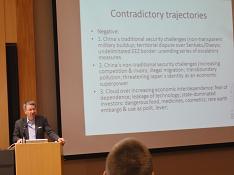
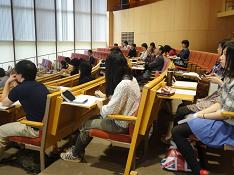
-----------------------------------------------------------------
ラインハルト・ドリフテ教授の特別講義@国際教養大学
CEAR (Center for East Asia Research) Special Lecture
東アジア調査研究センター・特別講義
Date/Time: 9/28(F), 15:30-16:45:
日時 2012年9月28日(金)15:30-16:45
Place: Akita Int'l Univ, Building D, Lecture Hall:
場所 国際教養大学D棟レクチャーホール
Speaker: Reinhard Drifte (Emeritus Professor, Newcastle University, UK; Visiting Professor, Pau University, France):
講演者:ラインハルト・ドリフテ(英ニューカッスル大学名誉教授、仏ポウ大学客員教授)
Topic: Japan and China: Managing rivalry, competition and conflict:
演題:日本と中国ーライバル関係、競争および対立の克服へ
Prof. Drifte
 ドリフテ教授
ドリフテ教授 Summary in English:
Professor Drifte's speech on Japan and China was very timely in view of the current dispute over the Senkaku islands and the 40th anniversary of the resumption of diplomatic ties between the two countries. He explained various obstacles to the establishment of "normal" relations" between Japan and China, and examined a number of possible scenarios for the future of their relationship.
His speech seemed to be quite instructive and informative to those students who are interested in the past history and current development of Japan-China relations, although at times there were unsatisfactory explanations and stereotype descriptions of some aspects of Japan and China.
The following is a summery of Prof. Drifte's lecture, prepared by himself:
”The lecture will look first of all at the contradictory trajectories of the overall relationship. i.e. increasing economic integration and rising traditional and non-traditional security challenges. Particular attention will be given to the territorial disputes (Senkaku/Diaoyu Islands; delimitation of the East China Sea border), the myth of ‘China needs Japan’, the various impediments to overcome the historical legacy, the Taiwan issue, the contradictions arising from Japan’s policy of engagement, and the problems presented by different negotiation styles. Finally I will discuss 5 possible scenarios for the future of the bilateral relationship, and how to avoid negative outcomes. I will refute a simplistic Liberal approach (’close economic relations prevent military conflict’), but also a simplistic realist approach that Japan’s hard power balancing against China can prevent military conflict. (Reinhard Drifte)"
(Reported by Takahiro Miyao)
-----------------------------------------------------------------
Summary in Japanese:
講演要旨
ドリフテ教授の日本と中国に関する講演は、日中間の尖閣諸島をめぐる対立と国交正常化40周年を迎えた現在、非常にタイムリーなものであった。講演では、まず日本と中国が真に「正常」な関係を樹立する上での多くの障害が説明され、今後の両国関係に関するいくつかのシナリオが検討された。内容的に、日本と中国の様々な側面について多少不十分だったりステレオタイプ的な説明の部分があったものの、日中関係に興味を持つ学生たちには非常に有益で、ためになる講演であった。
以下は、ドリフテ教授自身の講演要旨:
『まず、日本と中国が両国関係一般について矛盾する軌道上にあることが指摘される。例えば、経済統合が進む一方で、安全保障上の様々な問題が山積している。さらに以下のような問題に焦点を当てる。領土問題(尖閣諸島、東シナ海の領海)、「日本は中国にとって必要」神話、歴史遺産の克服への障害、台湾問題、日本の政策の矛盾、交渉スタイルの違いの問題など。最後に、両国間の将来に関する5つの可能なシナリオが取り上げられ、そのうちマイナスの結果をどう避けるかが議論される。特に、「経済関係が緊密になれば軍事的対立は防げる」といった単純すぎるリベラルなアプローチや、「日本が中国とハード面のパワーバランスを保てば軍事的対立は避けられる」いった単純すぎる現実主義的アプローチは共に否定される。(ラインハルト・ドリフテ)』
(報告者:宮尾尊弘)
-----------------------------------------------------------------
Prof. Drifte's presentation and the audience: ドリフテ教授の講演と参加者


-----------------------------------------------------------------
経済教育ネットワーク2011年度年次大会@同志社大学 [Report]
経済教育ネットワーク2011年度年次大会@同志社大学
シンポジウム「経済教育と法教育の対話」:
日時:2011年12月3日(土)13:00-17:00
会場:同志社大学至誠館S21教室
同志社大学キャンパスと篠原総一同志社大学教授(経済教育ネットワーク会長)による開会挨拶

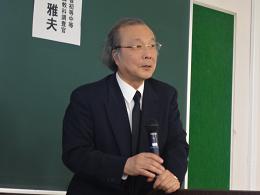
(左下)中川雅之日本大学教授による基調講演「法と経済学からみた『政治・経済』の問題」
(右下)パネルディスカッション司会・樋口雅夫文部科学省初等中等教育局教育課程課教科調査官
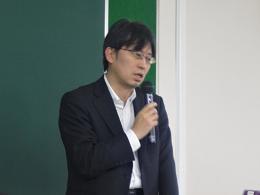
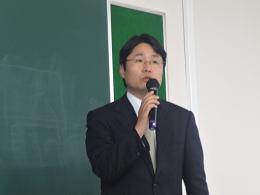
パネリストの報告と討論(左から)太田正行慶応義塾大学非常勤講師、新井明都立小石川中等教育非常勤講師、岩本知之静岡大学教育学部付属島田中学校教諭、中川雅之日本大学経済学部教授
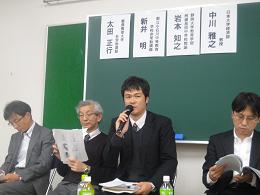
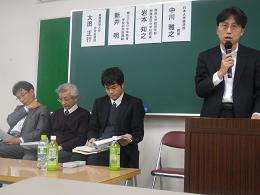
会場の参加者からパネリストへの質問とコメント
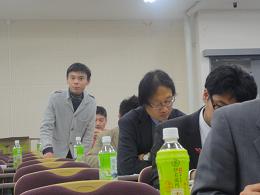
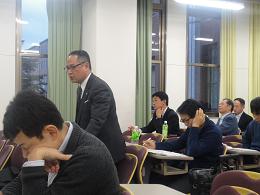
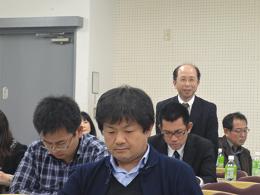
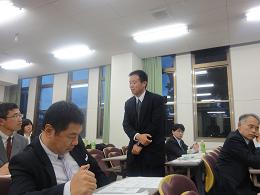
新井明小石川中等教育非常勤講師の総括挨拶と懇親会会場・アマーク・ド・バラディ
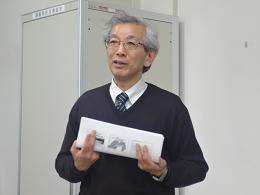

レポート:
先ず、経済教育ネットワーク代表の篠原総一同志社大学教授から開会の挨拶があった後、中川雅之日本大学経済学部教授より「法と経済学からみた『政治・経済』の問題」というテーマで基調講演があった。そこでは、中川氏の法律に関する実務経験を踏まえて、法教育のあるべき姿は法律の背後にあるロジックを理解させることにあると主張。さらに、法律を経済分野の内容と有機的に関連づけて教えるべきであることが指摘され、その具体例として、財産権と環境権についての経済的な意味づけが説明された。
それに引き続き、樋口雅夫文部科学省初等中等教育局教育課程課教科調査官による司会のもと、「経済教育と法教育との対話」というテーマで、太田正行慶応義塾大学非常勤講師、新井明都立小石川中等教育非常勤講師、岩本之静岡大学教育学部付属島田中学校教諭の三人から、それぞれの立場や経験に照らして、経済教育と法教育をどう考えるかが発表された。その上で、基調講演者の中川日本大学教授も加わり、パネルディスカッションが行われた。
会場の参加者からも活発な質問やコメントなどが出て、その中で法教育側からは経済学に対する「違和感」が表明されたものの、やはり法と経済の関係をもっと理解して生徒たちに教えることの重要性を認める発言がほとんどであった。また経済教育側からは法律に加えて、さらに政治との関係がポイントになるこが指摘され、公共的な財政政策などとの関連で「効率」と「公正」の問題を取り上げる際には、政治や法律との関係を考えることが必要不可欠であることが再認識された。
最後に、法教育側も経済教育側も、生徒たちが現代社会において自立した主権者としての自覚と知識を持つように分野を問わず協力して教育に当たることが重要で、そのためにも今回のような対話を続けていくことが必要との結論に達した。
参考:
経済教育ネットワークHP
http://www.econ-edu.net/
シンポジウム「経済教育と法教育の対話」:
日時:2011年12月3日(土)13:00-17:00
会場:同志社大学至誠館S21教室
同志社大学キャンパスと篠原総一同志社大学教授(経済教育ネットワーク会長)による開会挨拶


(左下)中川雅之日本大学教授による基調講演「法と経済学からみた『政治・経済』の問題」
(右下)パネルディスカッション司会・樋口雅夫文部科学省初等中等教育局教育課程課教科調査官


パネリストの報告と討論(左から)太田正行慶応義塾大学非常勤講師、新井明都立小石川中等教育非常勤講師、岩本知之静岡大学教育学部付属島田中学校教諭、中川雅之日本大学経済学部教授


会場の参加者からパネリストへの質問とコメント




新井明小石川中等教育非常勤講師の総括挨拶と懇親会会場・アマーク・ド・バラディ


レポート:
先ず、経済教育ネットワーク代表の篠原総一同志社大学教授から開会の挨拶があった後、中川雅之日本大学経済学部教授より「法と経済学からみた『政治・経済』の問題」というテーマで基調講演があった。そこでは、中川氏の法律に関する実務経験を踏まえて、法教育のあるべき姿は法律の背後にあるロジックを理解させることにあると主張。さらに、法律を経済分野の内容と有機的に関連づけて教えるべきであることが指摘され、その具体例として、財産権と環境権についての経済的な意味づけが説明された。
それに引き続き、樋口雅夫文部科学省初等中等教育局教育課程課教科調査官による司会のもと、「経済教育と法教育との対話」というテーマで、太田正行慶応義塾大学非常勤講師、新井明都立小石川中等教育非常勤講師、岩本之静岡大学教育学部付属島田中学校教諭の三人から、それぞれの立場や経験に照らして、経済教育と法教育をどう考えるかが発表された。その上で、基調講演者の中川日本大学教授も加わり、パネルディスカッションが行われた。
会場の参加者からも活発な質問やコメントなどが出て、その中で法教育側からは経済学に対する「違和感」が表明されたものの、やはり法と経済の関係をもっと理解して生徒たちに教えることの重要性を認める発言がほとんどであった。また経済教育側からは法律に加えて、さらに政治との関係がポイントになるこが指摘され、公共的な財政政策などとの関連で「効率」と「公正」の問題を取り上げる際には、政治や法律との関係を考えることが必要不可欠であることが再認識された。
最後に、法教育側も経済教育側も、生徒たちが現代社会において自立した主権者としての自覚と知識を持つように分野を問わず協力して教育に当たることが重要で、そのためにも今回のような対話を続けていくことが必要との結論に達した。
参考:
経済教育ネットワークHP
http://www.econ-edu.net/



